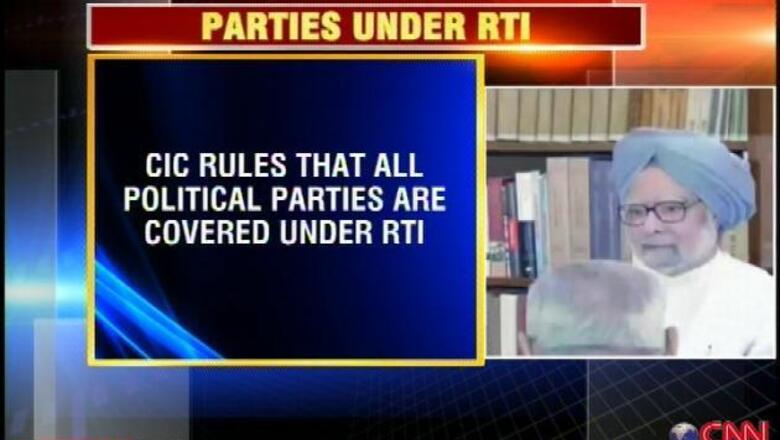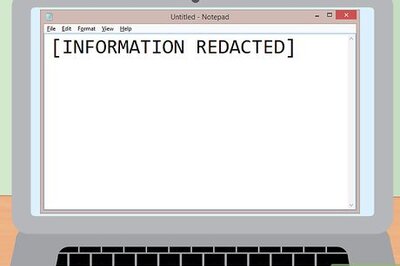
views
Anil Bairwal, national coordinator of Association for Democratic Reforms (ADR) and RTI activist joined IBNLive readers for an interaction on why political parties should come under RTI.
Q. If RTI is implemented on Congress then we all know what would happen. In that case it'll be very difficult to help Congress rule India and hence RTI shouldn't be applied on Congress atleast. Your thoughts? Asked by: Ravi
A. I think the situation is same in all the parties. The historical trend shows that the party in power gets more funds than the others. The case is the same in the center and in states. The real need is to throw more light on internal functioning of all the parties.
Q. A lot of debate whether or not sports bodies and political parties should come under RTI. What is the underlying philosophy? If it is that they get assets/facilities from the govt at free or nominal values than what about media houses? They also got free up linking, land etc at nominal values and create organizations sometimes thousands of crores worth. Then the corp houses which get land/water/mining etc at below market prices. Why not everybody? Asked by: Kamal Agg
A. RTI Act clearly defines the term Public Authority in section 2(h), as in which are the parameters that are essential for an organisation to be considered as public authority. Any organisation that passes the test of this 2(h) clause is Public Authority. Section 2(h) of RTI Act 2005- "public authority" means any authority or body or institution of self- government established or constituted- (a) by or under the Constitution; (b) by any other law made by Parliament; (c) by any other law made by State Legislature; (d) by notification issued or order made by the appropriate Government, and includes any- (i) body owned, controlled or substantially financed; (ii) non-Government organisation substantially financed, directly or indirectly by funds provided by the appropriate Government There is no doubt that we need more transparency in sports bodies and media functioning. However, that is a different topic altogether.
Q. Since almost all law makers are one in this the order of CIC may go waste? Asked by: sundar1950in
A. CIC is a quasi-judicial statutory body. The judgement that they have given is a step in right direction. The parties may now agree to come under RTI or decide to go to court, but this was the first step which was absolutely necessary. The parties may also try to change the RTI act, but that can also be challenged in the court, the way it was done in our PIL for declaration of assets/criminal records at election time.
Q. Where will the appeal lie for the CIC order to be quashed ?? Asked by: sundar1950in
A. The parties can appeal against the order in the Delhi high court. We have however filed a caveat so that unilateral stay is not given by the court before listening to our arguments. We also think that the CIC's order is based on very sound reasoning and the fact that it is a full bench order also gives it more weight.
Q. Apart from the funding pattern what other information may hurt the leaders who are averse to getting the parties under RTI ambit? Asked by: sundar1950in
A. The primary purpose of getting parties under RTI is not to hurt them by getting information but bring more clarity in their functioning. When people get more information about the functioning of the political parties, they will feel more engaged with the political system and it will strengthen both the democracy and the political parties. Other information that people can get from the parties are topics like: office bearers, details about the inner party elections, and so on. I also think, the party workers who work on the ground but feel that they do not get appropriate information on various issues can use the RTI for various purposes.
Q. Is there any safe guard to prevent misuse the act by other political party. otherwise all political party and sports organization should come under the RTI. Asked by: dks
A. The safe guards are built in the RTI act. Section 8 lists a number of exemption clauses which political parties can use to not disclose various information, e.g. they do not have to disclose any information which might blunt their competitive edge or the information that is personal in nature.
Q. Shying away from transparency is a confirmation of the shady way parties operate? Asked by: sundar1950in
A. Absolutely. The parties have been saying that they have nothing to hide and everything about them is transparent. They also say that they have been following all the laws of the land very scrupulously, like making declarations to IT dept and ECI. If that is so, there really is no reason to shy away from coming under RTI.
Q. The present system of EC monitoring the political parties is without teeth. The regulations at time of elections are CODE OF CONDUCT and not rules.We have seen violations of the code with no punishments. Can RTI help in taking forward violations to Court for punishing the violators? Asked by: sundar1950in
A. ECI does have lot of powers but not enough to penalise the political parties. It does not have deregistering powers, for example. What RTI will do is that it will through more light on their functioning and engage citizens in the scrutiny of their internal functions. That, in a democracy, is the best way to make any institution accountable.
Q. Isn't the funding political parties a prime reason for high amount of corruption like 2G. So isn't this a good move. Why should any party oppose it? Asked by: Narayan
A. Political parties need funding for their operations. There are no two thoughts about it. The issue is that that there should be complete transparency in the funding and how these funds are used. 80% to 90% of the funding of the parties is totally opaque right now. RTI will bring more clarity in this. Parties should welcome it as it will help in the long run.
Q. RTI should confine to Funding and source of funding, this will to a great extent cleanse the malaise plaguing current politics. Strategy and minutes should be kept out of the ambit of RTI, else we will be missing the wood for the trees. Asked by: S ESHWAR
A. RTI Act already has built in mechanism in section 8 "Exemption from disclosure of information". If Political Parties think a particular piece of information sought by an RTI falls under the provision of this section 8, they can deny providing that information by specifically providing reasons for the refusal. Therefore, the classification of what type of information will be provided and what not is already built-in the RTI Act.
Q. Even if parties come under RTI, how can we ensure that all donations under 20,000 are recorded with details of the donor? Can congress agree to take donations from Aadhaar card holders only as it is a great scheme introduced by them? Asked by: Ram
A. Since Political Parties are already filing Income Tax Returns and in that document they declare the quantum of their income under various heads. Therefore, those numbers appearing in the Income Tax Returns must be having a sound maintenance of records from which they have been arrived at. If an RTI requests the information about the sources of fund below Rs. 20,000 then if Political Parties maintain a register of funding below 20,000 they should provide information.If they deny this information, the legality of that denial will be looked upon by the CIC.
Q. The Law makers not wanting a law to operate on them is ironical. When politicians are there for public work what is so important for them to have privacy? Asked by: sundar1950in
A. There have been several judgements about this issue of personal information vs public interest, the accepted principle held by various judicial bodies has been that if the information is in the larger public good then that information should be made public.
Q. Hi Anil, First of all, many thanks for working towards bringing this change. I have a few points: 1. I heard few politicians saying that this move is undemocratic. How confident are you that this decision would not be subverted in court? 2. There is lot of black money which flows in system through political parties. If this link is exposed through RTI, are there strict laws that can help in ensuring the parties are de-registered? Thanks! Asked by: Ashish S
A. The CIC judgement given on 3rd of June where Political Parties have been made as Public Authorities is a 54 page judgement. This judgement has been given after providing ample opportunity to the representative of the Political Parties. Election Commission's view as well as the inputs of Income Tax Dept have also been taken before arriving at the judgement. This judgement is based on solid reasons and fundamentals. Therefore we are confident that this judgement will stand the scrutiny of higher courts. RTI will definitely help in bringing transparency in the sources of funding that Political Parties receive.
Q. Hi Anil, How about declaration of the funds not reported in Income Tax Reports? What are the various other reforms that would need to be brought as per ADR's view apart from RTI? Will RTI be a one stop solution for solving issues plaguing Indian politics? Thanks for your discussion. Asked by: Ram
A. Any source of income that is not declared in Income Tax return is a violation of Income Tax Act. Major electoral and political reforms that we suggest are Ban Candidates from contesting elections who have criminal cases against them, Fast track the cases against the elected representatives and bring Political Parties under a Regulatory Bill. RTI is not a one stop shop, we require a comprehensive framework to cure the electoral and political ailments of the country.
Q. Election commission is toothless similarly CAG also another toothless body, politicians will never allow any institution to be above them. Do you remember even during emergency period supreme court and High court powers were curtailed, therefore are you still positive that under RTI act they will become accountable? Asked by: kochappan
A. A public authority mentioned in the RTI act, is not "under" or "above" any institution. The President's Secretariat, Prime Minister's office and Secretariats of Lok Sabha and Rajya Sabha are already Public Authorities and respond to the RTI queries. This doesn't bring these highest institutions of our democracy under CIC or any other body. RTI Act provides Right to the citizens of the country to access information from the organisations that are Public Authorities, therefore question is not of accountability.



















Comments
0 comment